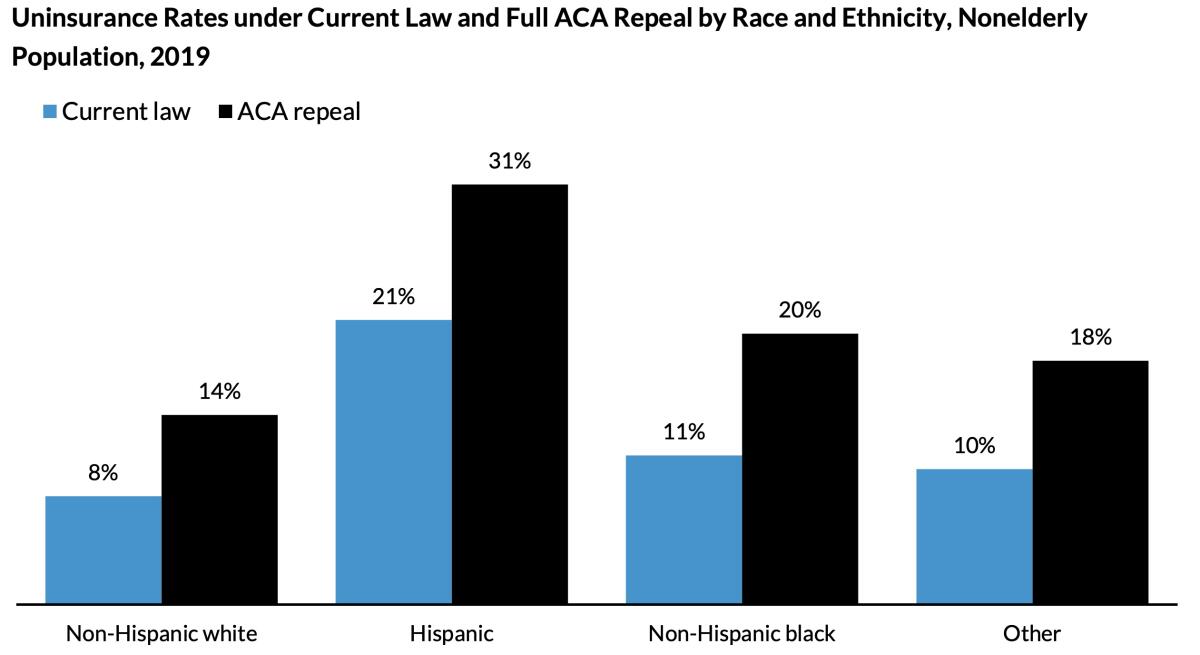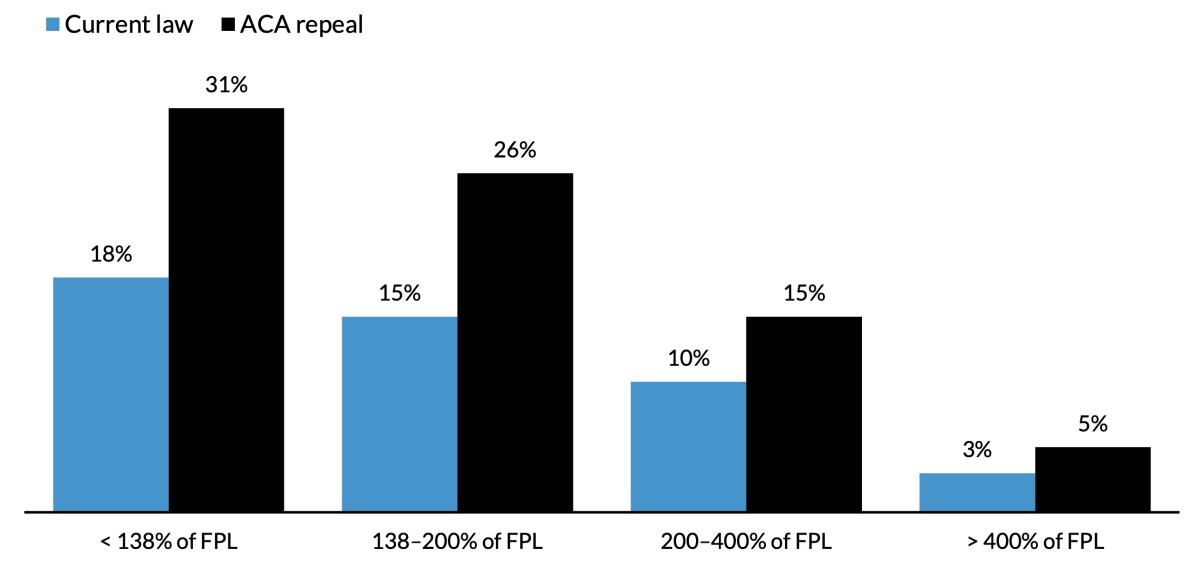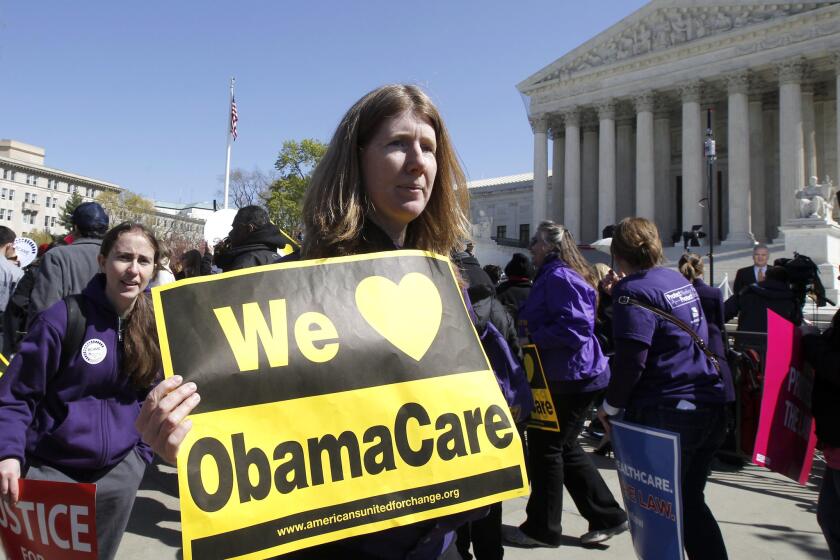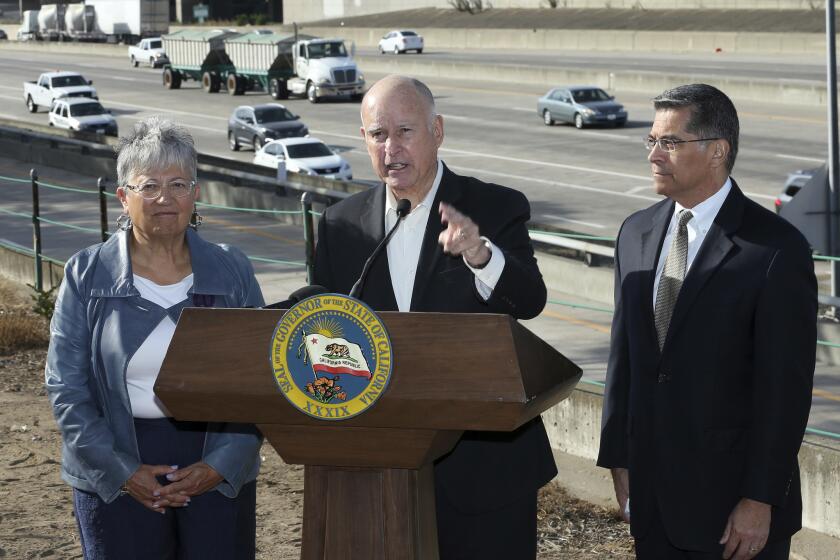Column: Incredibly, amid COVID-19 pandemic, Trump moves to take away your healthcare

Over the years, there have been many reasons to fear the reckless, heedless policies emanating from the Trump White House, like a miasma. Thursday brought us a reminder of what may be the scariest of all: The administration’s determination to overthrow the Affordable Care Act.
We’re talking about the government brief in a case brought by Texas and a score of other red states seeking to have the ACA declared unconstitutional. The brief is based on a theory that has been ridiculed by legal experts from one end of the political spectrum to the other.
Its impact would be almost indescribably profound, ripping health coverage from some 23 million Americans in the teeth of a pandemic that already has claimed more than 120,000 American lives and condemned untold others to years, possibly decades, of chronic disease.
This case has had nothing to do with law as we conventionally understand it. It’s an exercise of raw political power.
— Nicholas Bagley, University of Michigan
The brief “manages to be both mind-numbingly dumb and completely terrifying,” veteran healthcare expert Christen Linke Young of the Brookings Institution judges. That’s putting it mildly.
We’ve written before about the crackpot legal theory underlying the plaintiffs’ case and its endorsement by Trump. Before revisiting its arguments, let’s examine its consequences, should a majority of at least five Supreme Court justices buy in.
Generally speaking, the lawsuit and the White House endorsement reflect the Republican Party’s approach to healthcare and health coverage in the U.S., which is essentially vandalism. The GOP in Congress treat healthcare as a privilege, not a right.
The party doesn’t see health as a communal good, but merely something to be endowed upon those who can afford it; all others be damned.
A new poll shows that the Affordable Care Act is more popular now than ever. Here’s why.
That’s why 100% of its healthcare policy since the ACA was enacted in 2010 has been devoted to tearing down the law, and 0% to crafting an effective replacement. The Republican mantra has been “repeal and replace,” yet they’ve aimed for the first but never even tried to achieve the second.
Although most people think of the ACA chiefly in terms of the individual insurance exchanges that provide otherwise uninsured low- and middle-income households with subsidized health coverage, and of the Medicaid expansion that has brought no-cost coverage to the lowest-income households in the District of Columbia and 33 states that have accepted it, the law is much broader.
Overturning the ACA as unconstitutional would eliminate subsidized coverage for 10 million Americans and Medicaid coverage for 17 million more.

Protection for an estimated 133 million Americans whose preexisting medical conditions would freeze them out of the insurance market or condemn them to coverage exclusions or heavy premium surcharges — the obstacles they faced before the ACA — would be gone.
So too would the ACA’s ban on annual and lifetime limits on health benefits, limits on out-of-pocket expenses, a guarantee that every health plan cover 10 “essential benefits,” including prescriptions, hospitalization, maternity and newborn services, and mental health services.
The closing of the infamous Medicare prescription “donut hole,” which raised prescription prices for seniors, would end. The right of children to remain on their parents’ insurance until age 26 would be eliminated.
The ACA has been crucial in bringing healthcare services to Americans during the COVID-19 pandemic, in part because it has spurred demand for testing and treatment, and because the economic crisis caused by the pandemic has forced millions off their employer-based plans and into the individual or Medicaid market.
President Trump’s decisions not to reopen Obamacare plans and to roll back auto emissions rules are deadly.
Overturning the ACA would increase the number of uninsured Americans by more than 65%, raising it to 50.3 million from 30.4 million, the Urban Institute projects. Ethnic minorities and low-income Americans would be most severely affected.
More than 10.5 million people would lose their coverage in coronavirus hot spots such as Arizona, Texas, Florida, California, Georgia and the Carolinas, according to an estimate by the Center for American Progress.
Quite obviously, this spells disaster. Trump and his minions in the GOP evidently don’t know how to read.
That brings us to the legal argument, which has made its way through the federal courts since 2018. The plaintiffs’ case is based on the tax cut passed by a Republican Congress and signed by Trump in December 2017.
Unable to muster the votes to repeal the ACA outright, the Republicans chose in the tax cut measure to reduce the ACA’s penalty on Americans who failed to acquire health coverage to zero from about $700 per adult per year, with a maximum of about $2,000 per household. That effectively suspended the individual mandate, since there was no longer any cost from flouting it.
Texas and the other red states argued that this invalidated the entire ACA. Their reasoning was that the Supreme Court, in a 2012 decision written by Chief Justice John Roberts, had upheld the ACA by terming the penalty a “tax,” which Congress had an unchallengeable right to impose.
Reducing the “tax” to zero meant there was no tax, and therefore no mandate, and therefore no constitutional protection; because the ACA had to survive or fall as a whole, the plaintiffs asserted, the entire law must fall.
This argument came before a right-wing federal judge in Texas, Reed O’Connor, who bought it. His ruling invalidating the law was appealed to the conservative 5th Circuit Court of Appeals in New Orleans.
A three-judge appellate panel punted in a decision that legal scholar Nicholas Bagley of the University of Michigan derides as “blending arrogance and cowardice in equal measure” — arrogant because it ignored the essence of Roberts’ ruling, cowardly because it sent the case back to O’Connor without ruling itself on whether the whole law, or only parts of it, had to go.

Meanwhile the Trump administration threw in its lot with the plaintiffs by refusing to defend the law in court. The defense has been taken up by the now-Democratic House and a coalition of blue states led by California.
Instead of leaving things to O’Connor, the Supreme Court accepted the case. It’s not expected to rule until after the November election.
Whether one expects the court to uphold the law or kill it, or find a middle ground, this is arguably a big problem for Trump and the GOP. That’s because they can be blamed for leaving a crucial healthcare reform in limbo as the need for a functioning healthcare system grows more urgent by the hour.
The administration waited to file its legal brief with the Supreme Court on Thursday night to beat the filing deadline by minutes, so it might not be too proud of its handiwork — with good reason.
Legal experts see the government brief as replicating all the flaws of the underlying argument. The government argues that by reducing the individual mandate penalty to zero, Congress eliminated the “tax” because a tax that raises no revenue isn’t a tax.
But as Bagley notes, that’s not true — many taxes raise no revenue or have been suspended temporarily, but still remain in effect. That’s the case here.
Even if the Supreme Court holds that the individual mandate is invalid, there are no grounds to hold that the entire ACA must stand or fall as a whole — that its provisions are inseverable, in legal parlance.
The latest effort to gut Medicaid is Trump at his most dangerous.
“The ACA’s interlocking web of provisions cannot function as Congress intended” without the individual mandate, the government brief maintains. That’s absurd.
Numerous provisions of the law are unrelated to the individual insurance market the ACA established. Many relate to Medicare or to general healthcare policy and practice. Others set standards for health policies outside the individual market, such as employer plans.
As for whether Congress intended the zeroing out of the penalty to invalidate the entire law, there’s no evidence for that. Congress didn’t say so when it passed the tax cut bill.
The government brief weasels its way around this issue. It acknowledges that “Congress did not speak in general terms about ... severability,” when it passed the tax cut, but addressed only the “specific issue” of the penalty.
But it says that even if overturning the ACA was “not what its Members expected in 2017 when they amended the ACA,” that doesn’t matter (“there were likely Members on both sides” of the issue, the brief admits) — the penalty is “directly relevant to severability” and the court should consider the whole law inseverable.
Bagley observes: “This case has had nothing to do with law as we conventionally understand it. It’s an exercise of raw political power.” By asking the court to invalidate the Affordable Care Act, “the Trump administration is begging the court to give it an excuse to stop enforcing the entire law altogether.”
He’s right. This is an expression of Trump’s method of injecting chaos into everything he touches, as though the purpose of government is to make human existence harsher, crueler and more stupefying and terrifying than anyone could have imagined.
Throwing the healthcare system into anarchy at the very moment when millions of Americans face sickness and death from an implacable pathogen? So much the better. Welcome to Trump’s vision of America.
More to Read
Inside the business of entertainment
The Wide Shot brings you news, analysis and insights on everything from streaming wars to production — and what it all means for the future.
You may occasionally receive promotional content from the Los Angeles Times.














